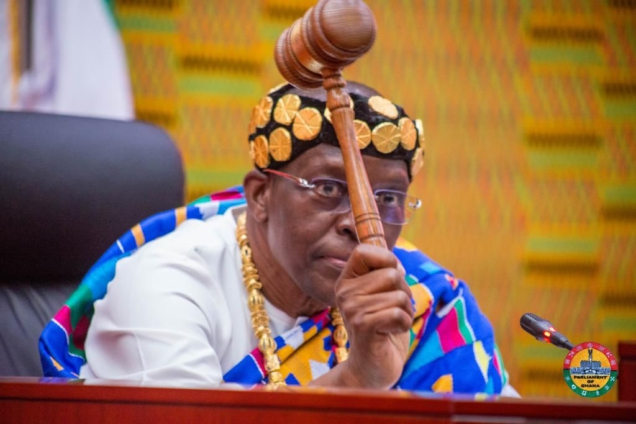Parliament has halted the processes of vetting and approval of nominees for Ministers and Deputy Ministers as a result of an ‘interlocutory injunction by the Supreme Court.’
Speaker Alban Bagbin who disclosed this in a statement to the House on Wednesday indicated that the House is unable to continue to consider President Nana Addo Dankwa Akufo-Addo’s nominees until after the determination of an injunction against the Speaker and the House.
This action, the Speaker, said is in the ‘spirit of upholding the rule of law.’
The pronouncement is a direct response to the refusal of President Akufo-Addo to receive the Human Sexual Rights and Family Values Bill 2024 (anti-gay bill) citing two Supreme Court injunctions brought against him signing the bill into law.
Secretary to the President, Nana Bediatuo Asante, in a letter on Monday, March 18, 2024, charged the Clerk to Parliament to refrain from further attempts to transmit the Bill to the President for his assent.
He cited two pending applications before the Supreme Court for an order of interlocutory injunction against the Bill.
Nana Bediatuo also revealed that the Attorney-General had informed President Akufo-Addo by a letter dated March 18, 2024, about the ongoing legal actions.
Portions of the letter read, “It has come to the attention of this Office that while the President and other senior officials of the Presidency were at Peduase for a Cabinet Retreat on Thursday, March 14, 2024, you attempted to submit the Human Sexual Rights and Family Values Bill, 2024 (the “Bill”) to Jubilee House for the president to signify his assent or otherwise to the Bill.”
“This Office is aware of two pending applications for an order of interlocutory injunction, both filed on March 7, 2024, in the Supreme Court in Dr. Amanda Odoi v. The Speaker of Parliament and The Attorney-General (J1/13/2023) and Richard Sky v. The Parliament of Ghana and The Attorney-General (31/9/2024), respectively, to restrain you and Parliament from transmitting the Bill to the President and also to restrain the President from signifying his assent to the Bill, pending the final determination of the matter.”
The Speaker noted that the 1992 Constitution has expressively provided the course of action for the President to take if he assents or refuses to assent to a bill, none of which President Akufo-Addo has made use of.
“The refusal to even accept the bill for consideration, therefore, falls outside the legal bounds established by our constitutional framework.”
“It is incumbent upon the President to accept the bill and take the necessary action within the prescribed constitutional limits, whether that action is assent, refusal, or referral to the Council of State for advice,” he stated.
Mr. Alban alluded to the inability of the President to receive the Bill due to the Supreme Court injunctions as the very same reason that restrains the Speaker and Parliament from going ahead with vetting and approvals of the ministers and deputy ministers-designate.




